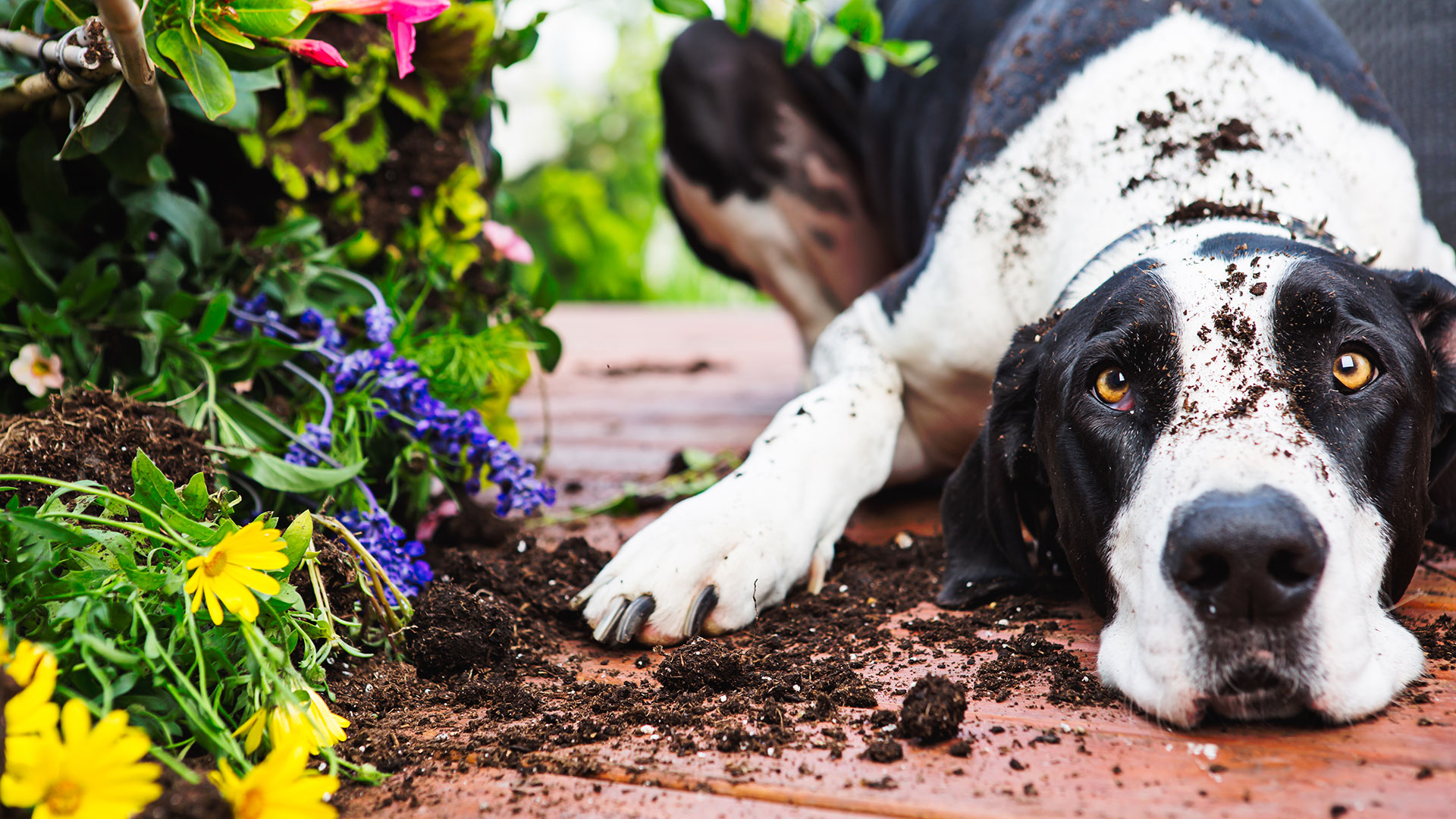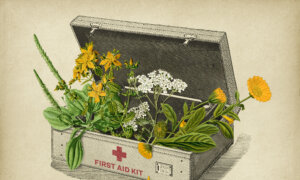For people who want to get started treating their dogs with herbs, a Western holistic herbalist who specializes in dogs has shared her treatments for some common ailments.
Rita Hogan, known as the Canine Herbalist, has helped hundreds of dogs of all types over the past 20 years. She also teaches classes promoting holistic canine herbalism, noting that when people see how well things work out with their dogs, they want herbal wisdom for themselves.
“Herbs can offer a gentle, natural, and effective way to support pets’ health, whether they’re dealing with a specific issue or you’re looking to keep them healthy long-term,” Hogan told The Epoch Times. “Herbs can help restore balance to the body and relieve common conditions like anxiety, arthritis, gut upset, or recovery from antibiotic use.”
She said her work brings her joy, and her aim is to help dogs live their best lives, in which they are “thriving” and not just “living.”
Cats can also benefit from herbs, Hogan said.
Small steps make a big difference, and people don’t have to overhaul everything overnight, according to her website CanineHerbalist.com. Little changes add up and can transform a dog’s health, it notes.
Hogan shared five categories of common ailments and herbs that she said can be used to address them.
Diarrhea, Vomiting, Upset Stomach
Marshmallow root: This is a go-to herb for soothing the digestive tract. It coats and protects the stomach lining, helping with inflammation, diarrhea, urinary tract infection, and acid reflux.
Ginger: A small amount of fresh or powdered ginger can ease nausea, gas, and motion sickness.
Chamomile: This herb reduces nervousness and soothes irritated stomachs.
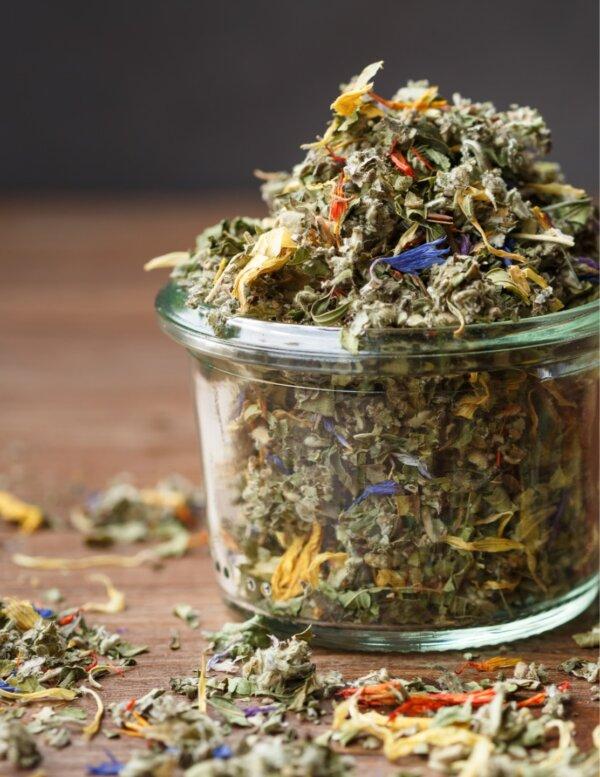
(Courtesy of Rita Hogan)
Joint Pain
For aging dogs or those with arthritis, herbs can reduce inflammation and improve mobility.
Turmeric: With natural anti-inflammatory properties thanks to its active compound, curcumin, turmeric is great for reducing pain and swelling in the joints. Pair it with a bit of fat to improve absorption.
Rose hips powder: This is another good anti-inflammatory ingredient for helping with arthritis and inflammation.
Skin and Allergies
Calendula: Soothing and healing, calendula can be used as a topical wash or salve to calm itchy or inflamed skin. It can also be used internally to help soothe the “inner skin” of the gut.
Nettle: This herb works as a natural antihistamine to relieve allergy-related itching and inflammation. It can be given as a tea or a dried herb, tincture, or glycerite.

A calendula officinalis flower. (Courtesy of Rita Hogan)
Stress and Anxiety
Lemon balm: This herb soothes the nervous system, helping dogs relax without sedation.
Skullcap: This plant helps calm the nervous system, restlessness, and anxiety.
Immune Support
Echinacea: This supports immune function and helps the body fight infections.
Astragalus: This plant provides long-term immune support, especially for senior dogs or those prone to illness.

An echinacea purpurea flower. (Courtesy of Rita Hogan)
Diet
Diet and herbs go hand in hand, and diet is the foundation of a pet’s overall health, according to Hogan. Herbs can support healing and balance, she said. But if the diet is poor, it’s like putting a bandage on a wound without addressing the cause.
A healthy, species-appropriate diet provides the nutrients and building blocks that allow herbs to work more effectively, according to Hogan.

(Courtesy of Rita Hogan)
“However, you can use herbs to help your dog or cat, with herbs to help process a more processed diet—herbs like milk thistle or burdock root,” she said.
In many cases, herbs can be safely used alongside conventional medicine, and they often complement each other, Hogan said.
Herbs can enhance the body’s natural healing process, support organ function, and even help reduce the side effects of some medications, she said.
For example, Hogan said, if a dog is on long-term pain medication for arthritis, adding an herb such as milk thistle can help protect the liver, which may be strained from processing those medications.
However, people should consult a veterinarian familiar with herbal medicine before combining the two, because herbs are powerful and some can interact with medications, she said.

Milk thistle. (Courtesy of Rita Hogan)
How to Give Herbs to Dogs
There are a few ways to give your dog herbs, Hogan said.
Hide herbs in food, or mix powdered or tinctured herbs into strong-smelling foods that your dog already loves, such as canned pumpkin, almond butter (natural, unsweetened), bone broth, yogurt, or raw milk.
Use herb-infused broth by steeping herbs in hot water and then mixing the cooled liquid with bone broth or chicken broth.
Sprinkle finely powdered herbs directly onto the dog’s food.
Dilute tinctures with water and syringe into the dog’s mouth.
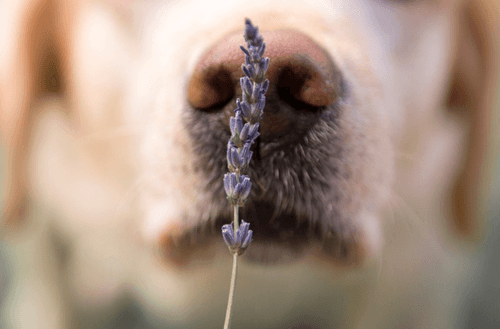
(Courtesy of Rita Hogan)
For extremely picky dogs, you can put powdered herbs into empty capsules and wrap the capsule in a small piece of cheese or meat, she said.
Herbal Energetics
Herbal energetics are a set of descriptions of how herbs affect the body—specifically their “temperature” and effect, Hogan said.
She said warm herbs heat the body, improve circulation, and are great for conditions in which things feel cold, slow, or stiff, whereas cool herbs cool the body, reduce heat and inflammation, and help calm conditions that are hot, irritated, or overactive.
“Dogs, just like people, have their own natural energetics. Some dogs tend to run ‘warm,’ while others run ‘cool.’ Matching or balancing their energetics with the right herbs can help keep them healthy,” Hogan said.

(Courtesy of Rita Hogan)
Warm dogs are often seem hot and restless, she said. They might pant a lot, seek cool places, have red or irritated skin, or always seem to overheat.
Hogan recommends cooling herbs to help balance their heat, noting that herbs such as chamomile, peppermint, nettle, and plantain can help calm inflammation, soothe irritated skin, and cool down the body naturally.

(Courtesy of Rita Hogan)
Hogan said cool dogs tend to run cold and be sluggish, and they may shiver easily, seek out warm spots, seem stiff when moving, or have slow digestion.
For these dogs, she said warming herbs such as ginger, turmeric, cinnamon, and rosemary can help bring energy, warmth, and circulation. These herbs improve blood flow, ease stiff joints, and warm the body internally, according to Hogan.
Backstory
“Every dog is unique—just like people,” Hogan said.
This motto inspired the name of her podcast “Dogs Are Individuals.”
Each dog has its own personality, preferences, and health needs, she said.
What works for one dog might not work for another, and that’s an important mindset to have when approaching their care, especially when using herbs, Hogan said.

Rita Hogan’s podcast “Dogs Are Individuals.” (Courtesy of Rita Hogan)
Hogan said she learned about the power of plants from her father, a prolific gardener whose knowledge of plants kept their animals healthy. This inspired her to learn herbalism in her late 20s.
At age 32, she opened a holistic kennel-free boarding facility on 36 acres in the Cumberland Mountains.
Shortly after that, Hogan began to notice a connection between behavior, diet, vaccination, and glandular imbalances. Through her work with her clients’ dogs and rescue dogs, she gained experience helping with difficult cases of disease and behavioral problems.
Hogan now has a clinical practice in Olympia, Washington, where she helps clients from all over the world. She teaches herbalism every week and makes her own herbal remedies. Courses can be purchased on another website of hers, CanineHerbalism.com.

Canine herbalist Rita Hogan. (Courtesy of Rita Hogan)
Some of her recent work has included helping a dog with cancer by giving it an herbal supportive protocol. That dog has been thriving for the past four years.
Hogan also helped another dog with a spinal condition and limited movement. Through herbs, she has helped the dog to be able to get around and even run again.
“Herbs have helped increase my clients’ longevity,” she said.
Additionally, Hogan is currently working on her second herbalism course and writing the first of three planned books on canine herbalism, titled “The Herbal Dog,” which is set to be released in February 2025.
“My goal with this book is to give pet owners the tools, confidence, and knowledge to care for their dogs in a holistic, mindful way,” she said. “The book gives you a step-by-step guide to understanding your dog as an ecosystem and choosing the right herbs and care strategies.”
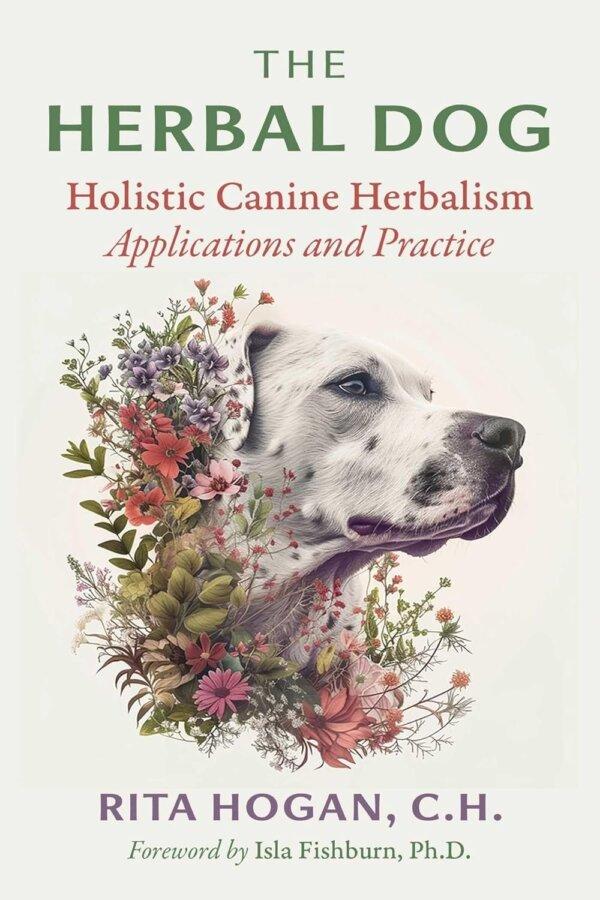
Rita Hogan’s book “The Herbal Dog,” to be released in February 2025. (Courtesy of Rita Hogan)
Health starts with balance; whether it’s diet, lifestyle, or herbal support, balance is the key, she said.
“My book helps you observe your dog and create a plan tailored just for them,” Hogan said.
Nature is powerful but gentle, she said, and herbs have been used for centuries for healing because they work with the body, not against it. They can prevent health issues, reduce the need for strong medications, and help dogs live longer, healthier lives, Hogan said.

(Courtesy of Rita Hogan)
Natural health care also strengthens the bond between you and your dog, she said.
“You’re not just ‘treating symptoms’ but really understanding and supporting their well-being; watching your dog thrive, knowing you’ve helped them naturally, is an incredibly special feeling,” Hogan said. “I love my work, and even though I can’t help everyone, just making a difference in one dog’s life is enough.”
